Journey into the saga of Joseph, Rachel's firstborn, and discover a tale of dreams, betrayal, and redemption that transcends time.
Rachel's Firstborn in the Bible
While it's easy to dismiss the tale of Rachel's firstborn as a mere biblical anecdote, you'll find there's much more beneath the surface than a simple story.
Rachel's intense longing for a child culminates in the birth of Joseph, a figure whose journey from dreamer to Egypt's second-in-command is nothing short of miraculous.
As you explore his life, you'll encounter themes of betrayal, resilience, and the power of forgiveness that resonate through the ages.
Joseph's legacy not only shapes the future of a nation but also offers profound insights into the human condition, inviting you to reflect on the complexities of faith, destiny, and redemption.
Key Takeaways
- Rachel's yearning for a child is met with divine intervention, resulting in Joseph's miraculous birth.
- Joseph's dreams play a crucial role in shaping his destiny and familial relationships.
- His birth and life symbolize themes of resilience, leadership, and the power of forgiveness.
- Joseph bridges cultural divides, contributing significantly to economic strategies and fostering reconciliation.
Rachel's Longing for Children
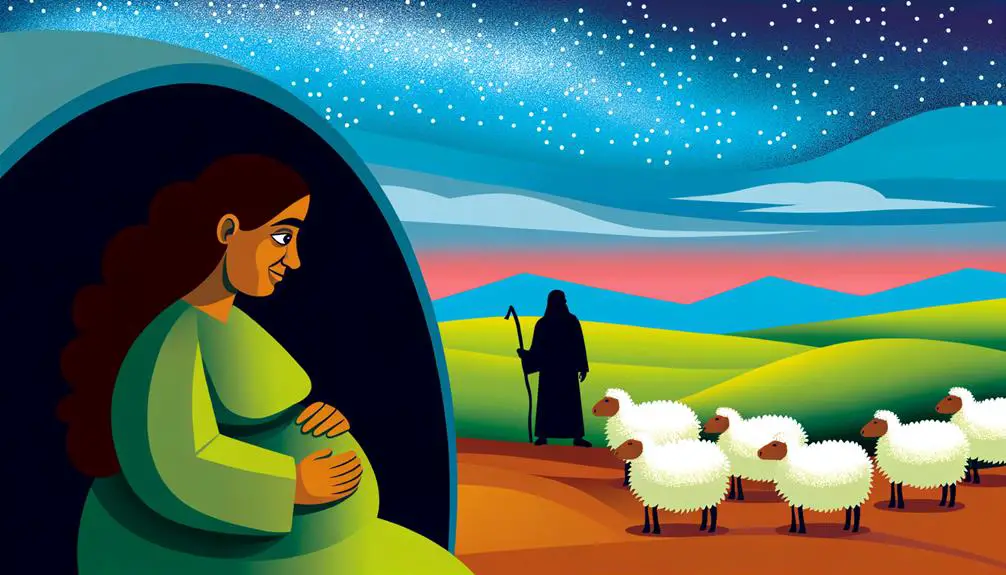
Rachel's deep-seated yearning for children painfully underscored her existence, reflecting a universal desire for motherhood and its profound implications on her identity and marital dynamics. You're witnessing a narrative that's as old as time yet uniquely personal. Rachel's fertility struggles weren't just medical or physical challenges; they were existential crises that dug deep into her sense of self and her place within her marriage and society. These struggles aren't just historical footnotes; they're lived experiences for many, making her story relatable and heart-wrenchingly human.
Delving deeper, you'll see that Rachel's situation was compounded by the societal expectations of the time, where a woman's worth was often measured by her ability to bear children. This external pressure intensified her internal turmoil, leading to a distressing cycle of hope and despair. Yet, her story isn't one of unending sorrow. It's also a narrative of divine intervention, where faith plays a crucial role in navigating through the stormy seas of doubt and desperation.
Divine intervention, in Rachel's context, served as a beacon of hope, a promise that her tears and prayers were heard. It's a testament to the belief that beyond the physical realm, there's a spiritual dimension where miracles are possible. This intervention didn't just aim at solving a physical inability but was about restoring faith, dignity, and peace to a troubled soul. Rachel's journey through her fertility struggles, marked by divine intervention, serves as a powerful reminder of resilience, faith, and the complex tapestry of human emotions intertwined with the divine.
Joseph's Miraculous Birth
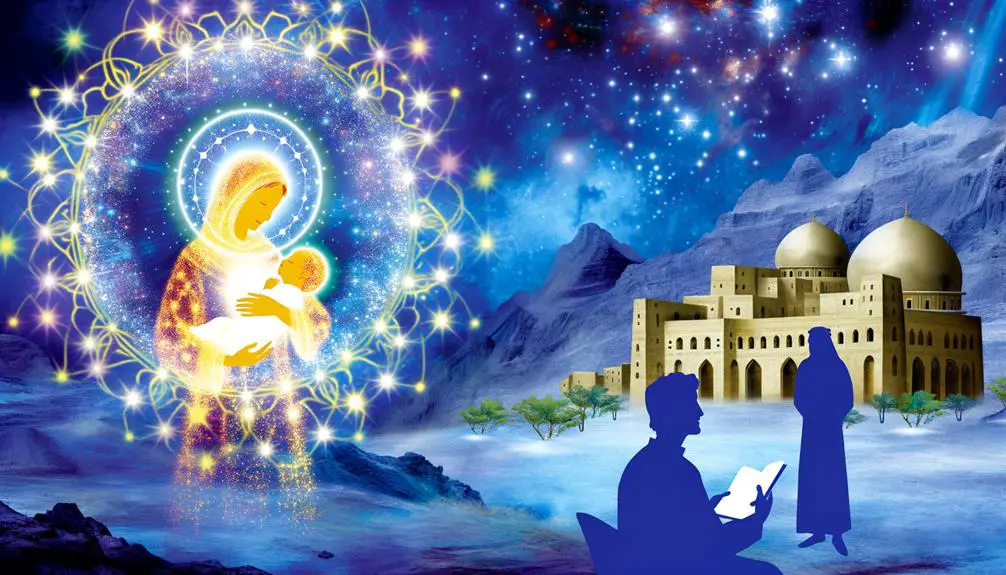
After years of anguished waiting, divine intervention finally paved the way for Joseph's miraculous birth, marking a pivotal moment in Rachel's journey towards motherhood. The narrative of Joseph's birth is deeply woven with themes of hope, faith, and the power of prayer, offering a rich tapestry for analysis.
Here are some key elements that underline the miraculous nature of Joseph's birth:
- Divine Intervention: It's clear that divine forces were at play in Joseph's birth. After many years of barrenness, Rachel's fervent prayers and faith resulted in a divine intervention, breaking the silence of infertility with the joy of a newborn.
- Fertility Prayers: The significance of fertility prayers in the biblical narrative can't be overstated. Rachel's prayers, combined with her unwavering faith, played a crucial role in her eventual conception. These prayers symbolize a direct communication with the divine, a plea for blessing that was ultimately answered.
- A Test of Faith: Rachel's journey to motherhood wasn't just a personal struggle but also a test of faith. Her patience and persistence in prayer, despite the discouraging circumstances, underscore the strength of her faith and her deep desire for a child.
- A Symbolic Birth: Joseph's birth wasn't merely the answer to long-held prayers; it was also a sign of hope and renewal. It symbolizes the idea that faith and patience can lead to miraculous outcomes, even in the face of despair.
In analyzing Joseph's miraculous birth, it's evident that divine intervention and fertility prayers played a significant role. This event not only marked a turning point in Rachel's life but also underscored the power of faith and perseverance in the biblical narrative.
The Dreamer Emerges
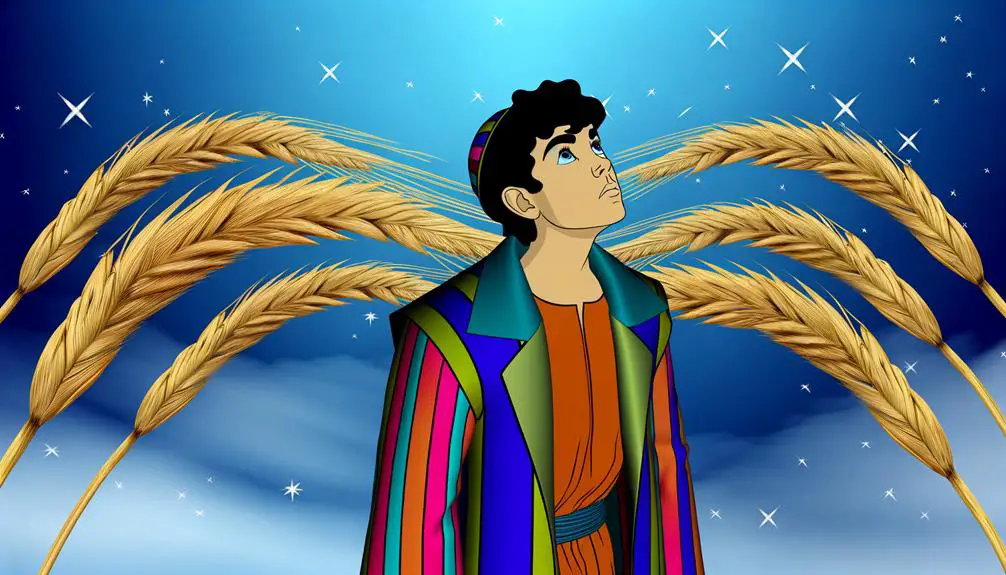
As you explore Joseph's journey, you'll encounter his vivid dreams, a pivotal moment that marks the beginning of his unique path.
These dreams not only showcase his inner world but also set the stage for escalating sibling rivalry.
Understanding these dreams and their impact is crucial in comprehending the complexities of Joseph's relationships and his eventual destiny.
Joseph's Vivid Dreams
Joseph's vivid dreams, marked by prophetic imagery and profound implications, quickly set him apart as a figure of destiny within his family's narrative. These dreams weren't just flights of fancy; they were layered with meaning and cultural significance, demanding interpretation.
Consider these aspects of Joseph's dreams:
- Dream Interpretation: Essential for understanding the messages conveyed, dream interpretation in Joseph's time was both an art and a science, deeply embedded in cultural practices.
- Cultural Significance: Joseph's dreams reflected not only his personal destiny but also the broader societal beliefs about dreams as divine messages.
- Prophetic Nature: The dreams foretold future events, showcasing Joseph's unique connection to the divine.
- Family Dynamics: The dreams played a pivotal role in shaping the relationships within his family, hinting at future leadership and trials.
In analyzing Joseph's dreams, you're diving into a world where dreams bridge the divine and the earthly, shaping destinies and dynasties.
Sibling Rivalry Begins
Exploring Joseph's vivid dreams reveals a burgeoning sibling rivalry, marked by envy and discord as his brothers perceive him not just as a dreamer but as a favored contender for their father's affection. This tension is not merely a tale of jealousy but a complex interplay of family dynamics, setting the stage for deep emotional scars.
Aspect |
Impact |
|---|---|
Dreams |
Catalyst for rivalry, setting Joseph apart |
Favoritism |
Intensifies brothers' resentment, fractures family bonds |
Jealousy |
Drives a wedge, leading to hostile actions |
Emotional scars |
Long-lasting effects on individual psyche, shaping future interactions |
Each element serves as a thread in the tapestry of their relationships, highlighting how early envy and discord sow seeds of lasting division.
Betrayal by Brothers
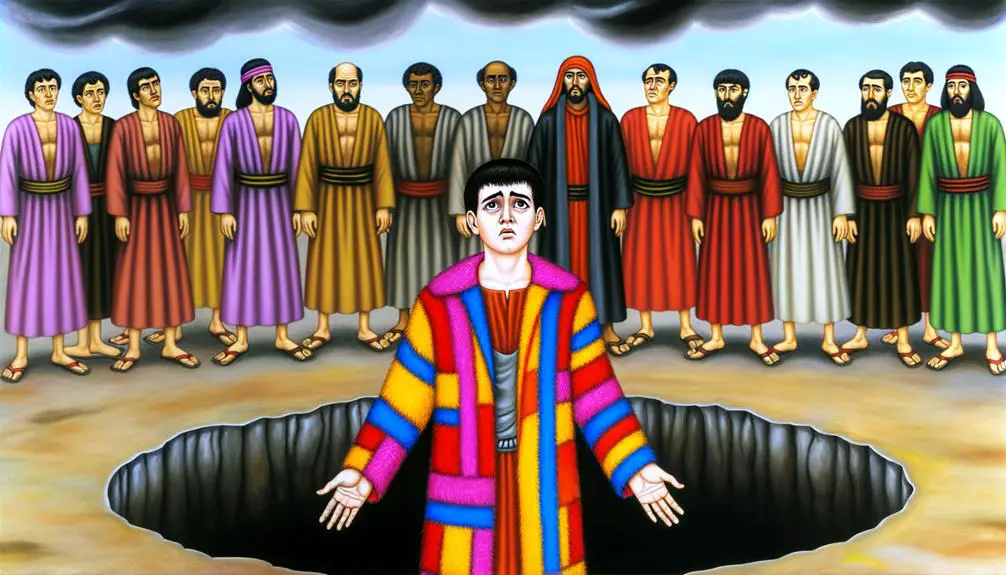
In the tale of Rachel's firstborn, jealousy and ambition drive his brothers to commit an act of profound betrayal. This moment in biblical history is a complex interplay of family dynamics and trust issues, which ultimately leads to a pivotal shift in the narrative.
Here's how this betrayal unfolds, marked by key elements that highlight its significance:
- Jealousy Takes Root: The favoritism shown by their father towards Rachel's firstborn fuels a deep-seated jealousy among the brothers. This emotional turmoil isn't just a passing sentiment; it's a powerful force that shapes their actions and decisions.
- The Dreamer's Visions: His dreams, which he shares with his family, are seen as presumptuous and further alienate him from his brothers. These visions, symbolic and prophetic, aren't just dismissed—they're taken as a threat to the existing family hierarchy.
- The Plot Thickens: The brothers' envy and fear culminate in a drastic plan. They decide to get rid of him, an act that underlines the severity of the trust issues within the family. This decision isn't made in haste; it's a calculated move driven by deep-seated animosity.
- Deception and Despair: The act of selling him into slavery and deceiving their father with a bloodied garment is the climax of their betrayal. It's a moment that encapsulates the breakdown of familial bonds and trust.
This betrayal, rooted in jealousy and ambition, not only highlights the complexity of family dynamics but also sets the stage for an incredible journey of redemption and leadership. It's a stark reminder that trust, once broken, can change the course of history.
From Slavery to Power
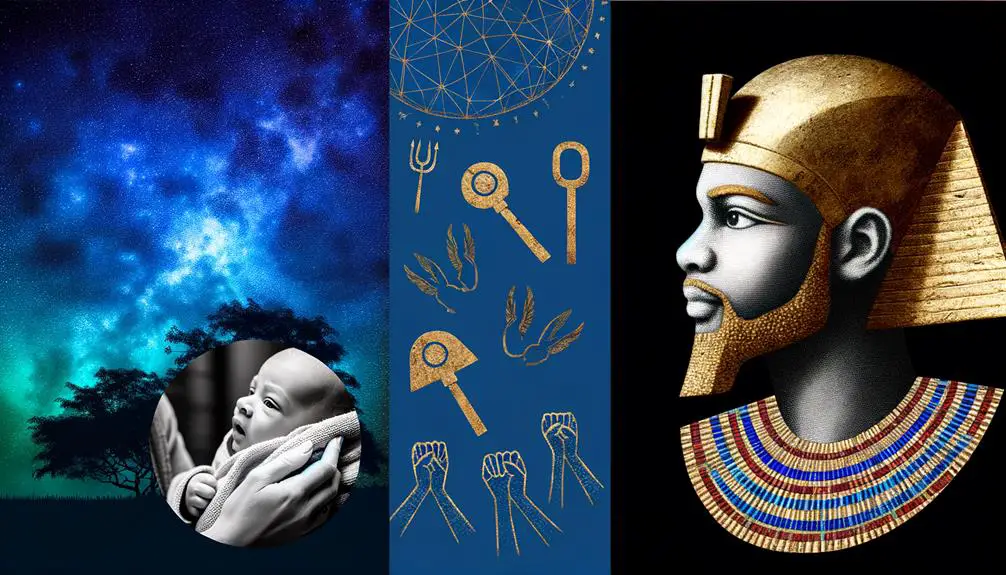
Having endured the ultimate betrayal by his brothers, Rachel's firstborn finds himself in Egypt, where an unforeseen journey from slavery to a position of immense power begins. This transition isn't just a tale of personal triumph; it's a masterclass in resilience, adaptation, and strategic thinking underpinned by Egyptian influence.
You observe how, upon his arrival, Rachel's firstborn doesn't just passively endure his fate. Instead, he leverages his unique skills, which catch the eye of Egyptian elites. His ability to interpret dreams, a skill highly valued in Egyptian culture, sets him apart. This isn't merely about surviving; it's about understanding and integrating into a new societal context, utilizing the very aspects of Egyptian culture that could elevate his status.
His rise to power is also a testament to his adept understanding of economic strategies. When faced with impending famine, a crisis that could decimate Egypt, he devises a plan. This isn't just any plan, but a comprehensive economic strategy that involves stockpiling resources during years of abundance to withstand years of scarcity. This approach not only saves Egypt but also establishes its economic dominance in the region.
Through his journey, you see how Rachel's firstborn doesn't merely adapt to Egyptian influence; he harnesses it, applying economic strategies with a precision that ensures not just his survival, but his ascent to a position of unprecedented power. His story is one of transformation, driven by an unparalleled ability to navigate and exploit the dynamics of power and economics in a foreign land.
Reconciliation and Forgiveness
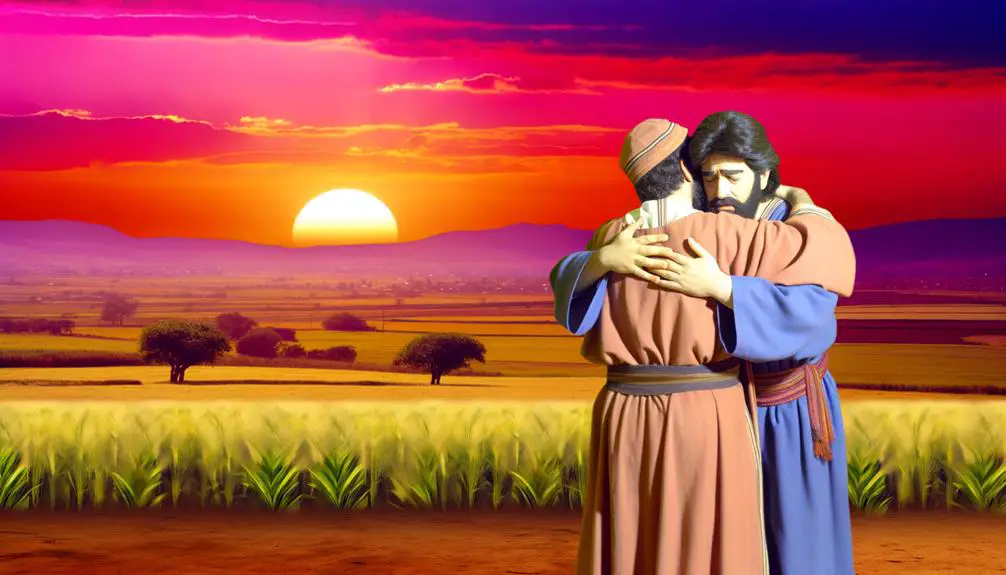
Rachel's firstborn's journey toward reconciliation and forgiveness marks a pivotal chapter in his narrative, showcasing a profound understanding of human emotions and the complexities of familial bonds. This chapter isn't just about mending broken relationships; it's an integral part of the healing process and a testament to emotional growth. You'll see how navigating through betrayal and hurt, he doesn't allow these experiences to harden his heart but instead uses them as stepping stones towards becoming a more compassionate and understanding individual.
To grasp the depth of this transformation, consider the following points:
- Acknowledgment of Pain: The first step in his journey involves acknowledging the deep-seated pain caused by his brothers' betrayal. This acknowledgment is crucial, as it lays the groundwork for the healing process.
- Empathy Towards Perpetrators: Despite the hurt, he develops an empathetic understanding of his brothers' actions. This empathy is a sign of immense emotional growth and maturity.
- Active Effort in Rebuilding Bonds: It's one thing to forgive, but he goes a step further by actively working to rebuild the broken familial bonds. His efforts underscore the importance of action in the reconciliation process.
- Letting Go of Resentment: The final step in his journey is letting go of any lingering resentment. This act is perhaps the most challenging yet rewarding, as it frees him from the chains of the past, allowing him to move forward in peace.
Through these steps, Rachel's firstborn not only reconciles with his family but also embarks on a profound journey of self-discovery and emotional healing. This narrative serves as a powerful reminder of the transformative power of forgiveness and the resilience of the human spirit.
Joseph's Legacy and Impact
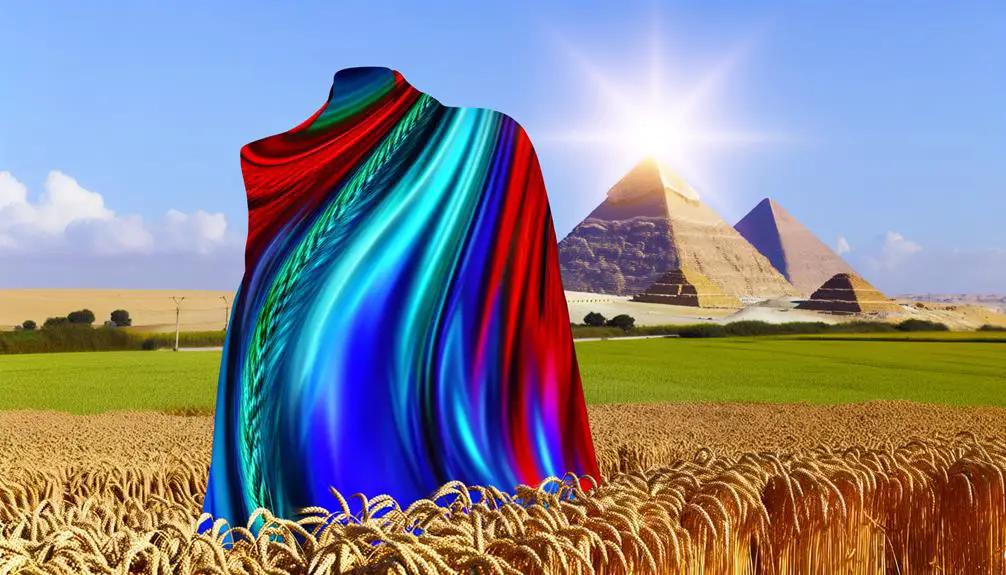
Building on his journey of reconciliation and forgiveness, Joseph's legacy and impact extend far beyond the familial, shaping the cultural and moral landscape of his time. You'll find his contributions particularly significant in the realms of economic strategies and diplomatic relations.
Joseph's foresight in agricultural management and storage techniques during years of plenty to prepare for years of famine not only secured Egypt's economic stability but also positioned it as a regional power. His innovative approach to resource management showcased an early understanding of sustainable practices, influencing future generations' economic policies.
Moreover, Joseph's role as a bridge between the Hebrews and Egyptians highlights his adeptness in fostering diplomatic relations. His ability to navigate the complexities of his dual identity, serving both as a Hebrew and a high-ranking Egyptian official, laid the groundwork for peaceful coexistence and mutual respect between these distinct cultures. This was a monumental feat, considering the historical tensions that often existed between different ethnic groups.
Joseph's impact wasn't just limited to his lifetime. His strategies and policies had a lasting effect, setting a precedent for economic planning and cross-cultural diplomacy that resonates even in today's globalized world. Through his actions, Joseph exemplified the power of forgiveness, strategic foresight, and the ability to transcend personal and cultural barriers for the greater good. His story encourages a deeper reflection on how individual choices can influence broader societal outcomes, underscoring the timeless relevance of his legacy in shaping ethical leadership and community resilience.
Frequently Asked Questions
What Are the Dietary Customs and Foods Mentioned in the Context of Rachel's Firstborn's Time?
You're delving into ancient dietary customs and foods, where ancient grain preservation and livestock breeding techniques played crucial roles.
These methods ensured a stable food supply, allowing for the cultivation and storage of grains, alongside the rearing of animals for meat, milk, and other products.
Understanding these practices gives you insight into how people sustained themselves, highlighting a sophisticated knowledge of agriculture and animal husbandry long before modern advancements in food production.
How Did the Naming Conventions in Rachel's Era Differ From Other Periods in Biblical History?
Ah, naming traditions, where creativity meets history.
You'd think they'd run out of names, but no. Back in the day, names were more than just a label; they were a prophecy, a hope, or a legacy.
Comparing periods, earlier biblical times saw names as deeply symbolic, often reflecting divine encounters or life's circumstances.
Fast forward, and you'll notice a shift towards names with personal or familial significance, blending tradition with individual identity.
What Were the Common Childhood Diseases and Their Treatments During the Time of Rachel's Firstborn?
During the era in question, common childhood diseases included infections and malnutrition-related illnesses. To combat these, societies relied heavily on infection prevention methods, including basic hygiene practices, and the use of herbal remedies.
These natural treatments, derived from plants, were critical in managing symptoms and aiding recovery. Knowledge about these methods was often passed down through generations, reflecting a deep understanding of their environment and its resources for healthcare.
Can You Explain the Role of Astrology and Celestial Events in the Lives of Biblical Figures Like Rachel's Firstborn?
Astrology beliefs and celestial symbolism played crucial roles in ancient narratives, guiding characters' destinies.
You'll find that stars and planetary movements were often interpreted as divine messages.
These celestial events weren't just for show; they influenced decisions, marked significant life events, and were seen as omens.
Analyzing these elements shows how deeply intertwined celestial phenomena were with individual fates, showcasing a rich layer of meaning and guidance in their lives.
How Did the Landscape and Geography of the Region Influence the Story of Rachel's Firstborn, Outside of Their Journey and Settlement Areas?
You'll find that the landscape and geography significantly molded the narrative through territorial conflicts and water scarcity. These elements weren't just backdrop; they actively shaped interactions and survival strategies.
Territorial disputes often arose over fertile lands and vital water sources, influencing alliances and hostilities. Water scarcity, a critical concern, dictated settlement patterns, economic activities, and migrations, underscoring its importance in shaping the historical and cultural context of the region.
Conclusion
In conclusion, Rachel's yearning bore fruit in Joseph, a beacon of resilience and forgiveness. His journey from the depths of despair to Egypt's pinnacle not only embodies the triumph of spirit over adversity but also weaves a tapestry of reconciliation that mends familial rifts.
Joseph's legacy, a masterclass in navigating life's tumultuous waters, illuminates the enduring power of faith and foresight. Like a lighthouse guiding ships home, his story remains a beacon for generations navigating the storms of life.

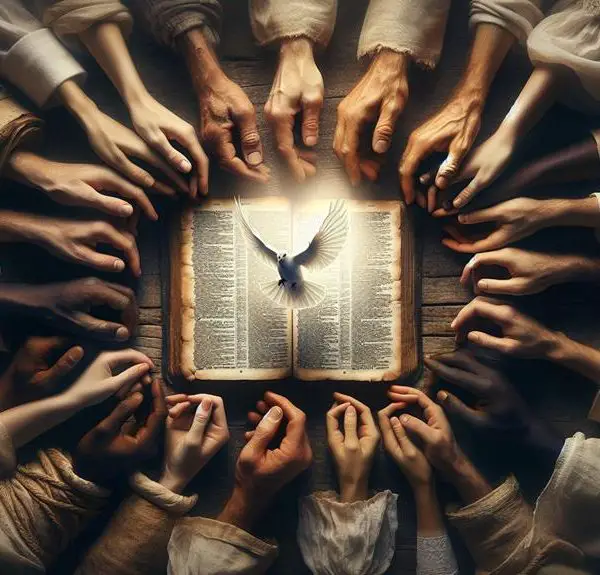
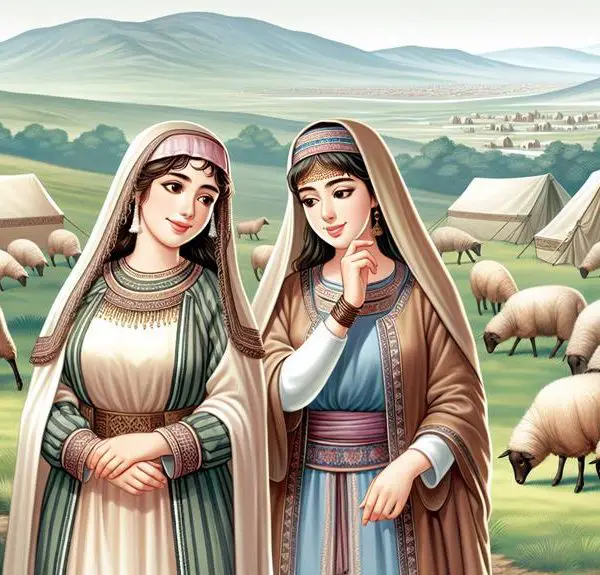
Sign up